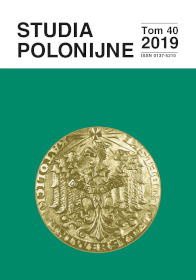Caucasus in Polish Plans for the Fight for Independence in the Nineteenth Century
Main Article Content
Abstract
The imperial policy of the Russian Empire led to the annexation of part of the Polish lands and the Caucasus by the end of the 18th and the beginning of the 19th century. This was noticed by Polish emigre politicians who decided to use the Caucasus in the fight for Polish independence. To this end, it was necessary to get closer to Turkey, which coincided with the direction of the policy of the Western powers – England and France, striving to stop Russian expansion in Europe and the Middle East. Based on the support of the Western powers, the envoys of Adam Jerzy Czartoryski, who runs the Polish emigre policy, have developed activities in Turkey against Russia. The article presents Polish actions aimed at transferring the struggle for independence to the Caucasus. Their particular intensity falls on the period between the November and January uprisings in Poland.
Modernizing in the nineteenth century, Turkey needed the staff support that the Poles offered to her. The price for the possibility of acting in Turkey was often religious conversion to Islam, which for many Poles was a huge problem. Nevertheless, the Polish military reformed the Turkish army and commanded its troops. Operating in Turkey, they also created plans for the fight for independence, taking into account the use of anti-Russian forces in the Balkans and the Caucasus. This opened the way to the creation of Polish military units there, which took up the fight there with Russia during the Eastern War and after it. The article presents the treatment of Polish military and emissaries sent by Hotel Lambert to the Caucasus, among whom the greatest merit was given to Michał Czajkowski and generals: Wojciech Chrzanowski, Feliks Breański and Ludwik Bystrzonowski. However, it was not until 1857 that Colonel Teofil Łapiński created a military unit that fought with the Russian army in the Caucasus.
The article attempts a critical analysis of the achievements, which includes two elements. The first is the polemic with the stereotypes in Poland about the Caucasus. The second is the comparison of the existing arrangements with sources produced in the nineteenth century on the Russian side of the Caucasian front by Polish exiles and Russian institutions. Both lead to the conclusion that despite the failure of the Polish military action in the Caucasus, taking action there proves the determination and vastness of the intellectual horizons of Polish independence environments in the nineteenth century.
Article Details
References
Caban W., Służba rekrutów z Królestwa Polskiego w armii carskiej w latach 1831-1873, Warszawa 1973.
Chudzikowska J., Dziwne życie Sadyka Paszy. O Michale Czajkowskim, Warszawa: PIW 1971.
Chudzio H., Generałowie polscy w obronie twierdzy Kars podczas wojny krymskiej, „Studia z Historii Społeczno-Gospodarczej” 9(2011).
Dopierała K., Adampol-Polonezkoy: z dziejów Polaków w Turcji, Poznań: Wydawnictwo Naukowe UAM 1983.
Furier A., Czeczenia i jej mieszkańcy w oczach Polaków, „Etnografia Polska” 41(1997), z. 1-2.
Furier A., Historyczne aspekty kulturowego zróżnicowania Kaukazu, „Sprawy Narodowościowe” (Seria nowa) 2000, z. 16-17.
Furier A, Kozacy w społeczeństwie rosyjskim, „Przegląd Zachodni” 1998, nr 2(287).
Furier A., Polacy w Gruzji, Warszawa: TRIO 2009.
Furier A., Polskie ślady w czeczeńskiej historii, „Przegląd Polonijny” 21(1995), z. 3(77).
Furier A., Wielokulturowość Kaukazu. W poszukiwaniu genezy zróżnicowania kulturowego regionu, „Sprawy Narodowościowe” (Seria nowa) 1999, z. 14-15.
Kalembka S., Wielka Emigracja. Polskie wychodźstwo polityczne w latach 1831-1862, Warszawa: Państwowe Wydawnictwo Wiedza Powszechna 1971.
King Ch., Widmo wolności. Historia Kaukazu, Kraków: Wydawnictwo Naukowe UJ 2008.
Klibanow A.I., Istorija religioznogo sekstianstwa w Rossii (60-je gody XIX w. – 1917 g.), Moskwa: Wydawnictwo „Nauka” 1965.
Konopczyński W., Polska a Turcja 1683-1792, Warszawa: Instytut Wschodni 1936, reprint: Kraków, Muzeum Historii Polski 2013.
Łapiński T., Die Bergvolker des Kaukasus und ihre Freiheitskampf, Hamburg: Hoffman und Dampe 1863.
Łątka J.S., Romantyczny kondotier, Katowice: Wydawnictwo „Śląsk” 1988.
Nowak J., Władysław Zamoyski. O sprawę polską w Europie (1848-1868), Poznań: Wydawnictwo Poznańskie 2002.
Pachoński J., Generał Jan Henryk Dąbrowski 1755-1818, Warszawa: Wydawnictwo MON 1985.
Piwnicki G., Polscy wojskowi i zesłańcy w carskiej armii na Kaukazie w XIX i na początku XX wieku, Toruń: Wydawnictwo Adam Marszałek 2001.
Reychman J., Życie polskie w Stambule w XVIII wieku, Warszawa: PIW 1959, s. 217-241.
Roszczyn M., Islam w Rosji: umma dopiero się rodzi, „Nowa Polityka Wschodnia” 2013, nr 3-4.
Skowronek J., Kontrowersje wokół Sadyka Paszy: (na marginesie pracy Wandy Smochowskiej-Petrowej, „Michał Czajkowski – Sadyk Pasza i Bałgarskoto wazrażdane”, Sofia 1973), „Przegląd Historyczny” 1976, nr 67(4).
Skowronek J., Polityka bałkańska Hotelu Lambert 1833-1856, Warszawa: UW 1976.
Systemy polityczne i kultura prawna państw azjatyckich, red. J. Marszałek-Kawa, M. Bidziński, Toruń: Wydawnictwo Adam Marszałek 2018.
Taylor-Terlecka N., W oczach Zachodu: scenki z życia domowego Czerkiesów (na podstawie relacji podróżników), „Pro Georgia. Journal of Kartvelological Studies” 2015, nr 25.
Urquhart D., The secret of Russia in the Caspian and Euxine. The Circassian war as affecting the insurrection in Poland 1863 (unknown binding); reprint Franklin Classics Trade Press 2019.
Wereszycki H., Stosunki Hotelu Lambert z Hercenem i Bakuninem w przeddzień powstania styczniowego, „Przegląd Historyczny” 1957, nr 2.
Widerszal L., Sprawy kaukaskie w polityce europejskiej w latach 1831-1864, Warszawa: Towarzystwo Naukowe Warszawskie 1934, reprint: Warszawa: Wydawnictwo Neriton 2011.
Żurawski vel Grajewski R., Kaukaz w „dyplomacji” księcia Adama Jerzego Czartoryskiego w okresie kryzysu wschodniego (1832-1840), „Przegląd Nauk Historycznych” 2(2003), nr 2(4).

